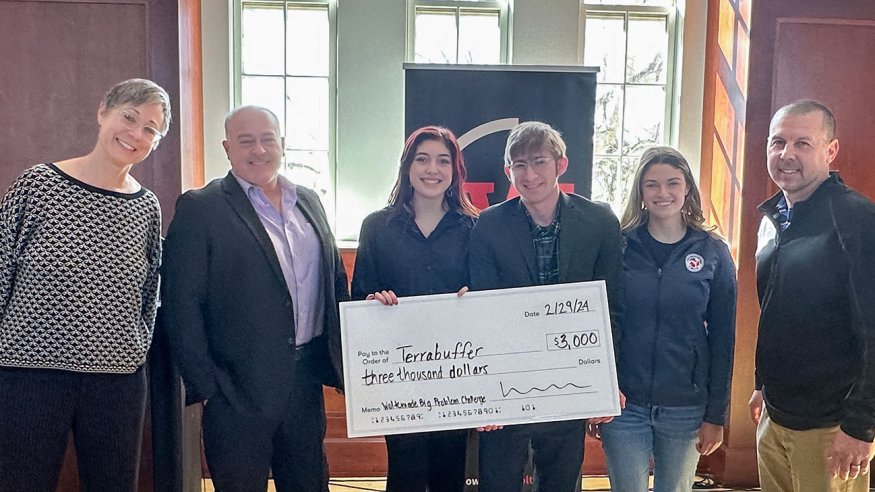
Clear Determination
Ohio Wesleyan Students Tackle 'Big Problem Challenge' to Improve Water Quality
Ohio Wesleyan University students presented solutions to help improve the water quality of the Ohio River and Lake Erie when they competed for up to $3,000 in business startup funds at OWU's first "Big Problem Challenge."
The Feb. 29 event was organized by Ohio Wesleyan's Woltemade Center for Economics, Business and Entrepreneurship.
"The premise is that we are trying to solve an environmental problem … with entrepreneurial ideas," Matt Vollrath, the Louis A. Simpson '58 Endowed Faculty Director of The Woltemade Center told those gathered in Merrick Hall for the inaugural event.
"These teams are pitching some sort of vision for a business venture that will simultaneously be financially viable and sustainable and address this problem of water pollution," Vollrath said. "We have five teams presenting. There were 11 teams that submitted proposals, and these (five) were selected by a committee of six evaluators as the most promising proposals."
Terrabuffer
The winning team of Blake Johnson '24, a Politics and Government major from Centerburg, Ohio, and Zoë Swanson '24, a Pre-Professional Zoology major from Mansfield, Ohio, earned $3,000 for their proposal, "Terrabuffer: Sustainable Solutions."
"Agricultural runoff (herbicides, pesticides, fertilizer, and sediment) is seeping into Lake Erie from local small to mid-sized farms in the Sandusky area," Johnson and Swanson explained in their proposal. "This runoff negatively impacts farmers by polluting the water and eroding river banks along farmland, which, in the long run, harms farmers' crop yields, reduces soil quality, and diminishes the amount of land available for future farming."
To address the problem, they proposed Terrabuffer, "a seasonal Sandusky-based landscaping company that installs buffer strips along farmland close to Lake Erie." The buffer strips would use native plants capable of collecting and absorbing harmful pollutants before they reach the water.
"We work with farmers to preserve the farmland and develop it into future generations," Johnson said.
Blooms to Hues
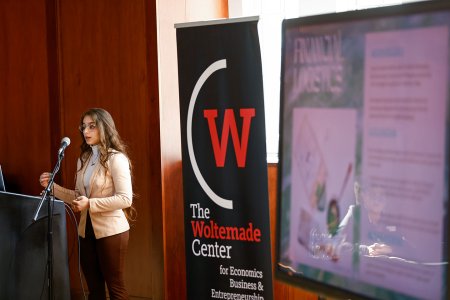
Amarilys Torres-Nuñez '25, a Zoology and Sociology/Anthropology double major from San Manatí, Puerto Rico, earned second place and received $1,000 for her solution, "Blooms to Hues: Transforming Lake Erie Algae into Sustainable Paints."
Harmful algae blooms, or HABs, play a large role in polluting Lake Erie, Torres-Nuñez said in her proposal, as the blooms produce toxins when infected with cyanobacteria (blue-green algae). As the blooms die and decay, they also use up all of the available oxygen, creating environmental dead zones. "My initiative involves harvesting these blooms … and utilizing the chlorophyll pigments to make an eco-friendly solution – paint," she said.
Torres-Nuñez told the judges her solution is proven, not unique, and is used in Denmark, France, and other areas with companies and artists already using the blooms to create algae pigments and 100% biodegradable milk-based paint. "The target audience would include environmentally conscious customers, eco-friendly businesses and organizations, as well as artists," she said.
Saline Solutions
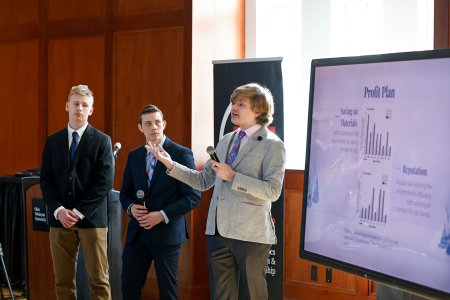
Alex Bzdafka '27, a Biology and Environmental Science double major from Solon, Ohio; Ryan McKee '24, a Pre-Professional Zoology major from Rockville, Maryland; and Luke Miller '27, an Environmental Science major from Excelsior, Minnesota, earned third place and $500 for their "Saline Solutions."
"Local governments are spending large amounts of salt to prevent roads from freezing and getting covered in snow," they explained in their proposal. "[C]ities are applying more salt than necessary as a precaution for inclement weather conditions. Cities are also salting roads that are unlikely to get used during these times. … The increased amounts of salt used for the roads are also running off into local waterways contaminating our drinking water as well as freshwater ecosystems."
To address the problem, the Ohio Wesleyan students proposed using mapping software (GPS, GIS) to "locate areas where cheaper salt alternatives can be applied or where no salting needs to be done. We can also determine when to use salt, based on temperature and expected snowfall. In doing this, we will save municipalities money, and time while also decreasing our ecological impact."
Elemental Advances
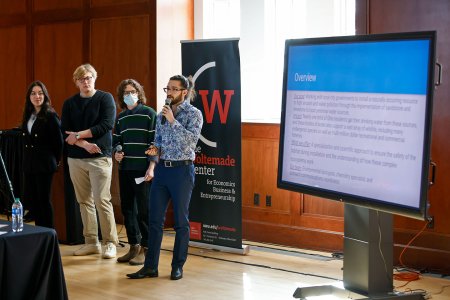
Also participating in the inaugural Big Problem Challenge was a team of Payton Andisman '24, a Biology major from Akron, Ohio; Owen Dooley '27, a Chemistry major from Springfield, Ohio; Matthew Kelley '24, an Environmental Science major from Centerburg, Ohio; and Andrea Pichardo '27, a Biochemistry and Environmental Science double major from Centerburg, Ohio.
Their team proposed "Elemental Advances: Sandstone/Limestone Filtration," noting that the highly porous rocks "have the ability to filter impurities such as agricultural runoff and prevent eutrophication" (water becoming overly enriched with nutrients, leading to rapid plant growth including algae blooms). "As water passes through the rock," they said, "contaminants are trapped in tiny pores. Additionally, limestone's alkaline nature neutralizes polluted, acidic water sources."
Mercury Reduction
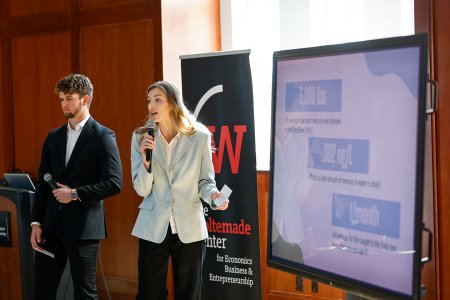
Alex Casper '24, a Computer Science, Data Analytics, and Quantitative Economics triple major from Uniontown, Ohio, and Jocelyn Weaver '24, an Environmental Science, Geography, and Botany triple major from Loudon, Tennessee, rounded out the roster of competitors with their proposal, "Mercury Reduction in the Ohio River."
"Mercury significantly impacts the Ohio River's health, with dangerously high levels reported, increasing by 500% in the last 15 years," they shared in their proposal. "This pollution poses health risks to humans, the ecosystem, and wildlife. … We plan to construct a facility along the river capable of treating the water through adsorption, the most effective method for our purposes. Adsorption benefits include no sludge production, high selectivity for mercury and other heavy metals, and flexibility in choosing adsorption media materials." They also would sell the recovered mercury – used in thermometers, fluorescent light bulbs, and other products – as another revenue source.
'Lots of Opportunities Here'
The students had five minutes to present their plans before a panel of expert judges that included Lauren Richards, natural resources specialist for Preservation Parks of Delaware County; Lisa Roberts, watershed and sustainability coordinator for the City of Delaware; Phil Smith, director of the Delaware Entrepreneurial Center at Ohio Wesleyan University (DEC OWU); and Brian Stier, business teacher and Entrepreneur Academy instructor for Dublin City Schools.
The cash prizes were supplied by Latham Bishop Ventures, an endowed program funded by OWU alumna and entrepreneur Carol Latham '61. The Latham Bishop Ventures program is an institutional collaboration managed by The Woltemade Center that includes the OWU Connection, DEC OWU, and the Economics and Business Department.
"This is our program to build interest in entrepreneurship and to help you along as you develop those interests," Vollrath told the students watching the competition. "If this is something that's exciting to you, I encourage you to explore the class offerings that we have and ... how we can set you up with some coaching, with some business plan development, and maybe even some resources beyond that – perhaps integrating your interests into your academic study, with credit. There are lots of opportunities to explore entrepreneurship here."
Learn more about the Big Problem Challenge, Latham Bishop Ventures, and other Woltemade Center programs, initiatives, and opportunities at owu.edu/woltemade.
